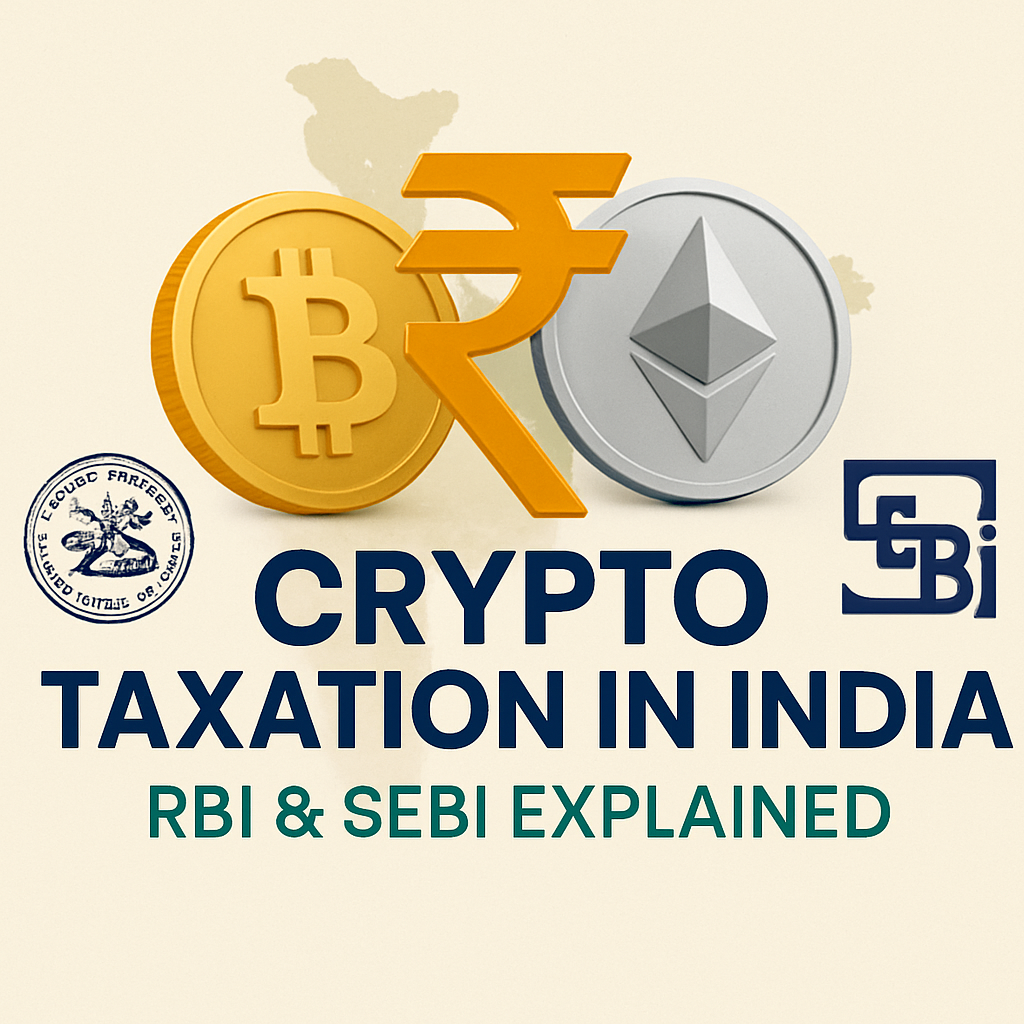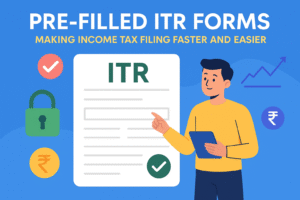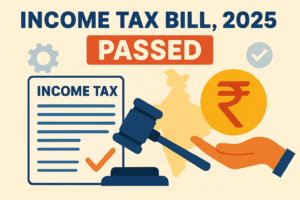Index
1. Introduction
2. Regulatory Framework Governing Cryptocurrencies in India
2.1 Role of RBI
2.2 Role of SEBI
3. Taxation on Cryptocurrency Trading in India
3.1 Income Tax on Crypto Profits
3.2 TDS on Crypto Transactions (Section 194S)
3.3 GST on Crypto Transactions
4. Classification of Cryptocurrency Income
4.1 Income from Capital Gains
4.2 Income from Business or Profession
5. Tax Rates Applicable on Crypto Transactions
6. Reporting Cryptocurrency in ITR (Income Tax Return)
7. Penalties for Non-Compliance
8. Challenges in Crypto Taxation in India
9. Recent Updates and Future Expectations
10. Conclusion
11. References
—
1. Introduction
Cryptocurrency trading in India has gained tremendous popularity over the past few years. However, with its rapid adoption came the need for clear regulatory and taxation policies. Both the Reserve Bank of India (RBI) and the Securities and Exchange Board of India (SEBI) play crucial roles in regulating cryptocurrency activities, although there is no complete legal framework yet. This blog provides a comprehensive overview of how cryptocurrency trading is taxed in India, along with the latest updates from RBI, SEBI, and the Income Tax Department.
—
2. Regulatory Framework Governing Cryptocurrencies in India
2.1 Role of RBI
The RBI, India’s central bank, has historically been skeptical about cryptocurrencies. In 2018, it banned banks from facilitating crypto transactions. However, in March 2020, the Supreme Court overturned this ban, allowing cryptocurrency trading to resume legally.
Currently, the RBI does not consider cryptocurrencies as legal tender but allows trading and investment activities under certain compliance standards. The RBI has also initiated the development of its own Central Bank Digital Currency (CBDC), called the Digital Rupee.
2.2 Role of SEBI
SEBI oversees the investment and securities markets in India. If cryptocurrencies are classified as “securities” under Indian law, SEBI will have regulatory authority. SEBI plays a role in regulating crypto assets that resemble traditional securities, especially regarding Initial Coin Offerings (ICOs) and crypto-based investment products.
Important Note:
Both RBI and SEBI have been working together on the proposed Crypto Bill, which is expected to provide more clarity.
—
3. Taxation on Cryptocurrency Trading in India
3.1 Income Tax on Crypto Profits
In the Union Budget 2022, the Indian government introduced Section 115BBH, effective from April 1, 2022, to tax Virtual Digital Assets (VDA), including cryptocurrencies.
Key points:
- 30% tax on profits from the sale of cryptocurrencies.
- No deduction of expenses allowed, except for the cost of acquisition.
- Losses from crypto trading cannot be set off against other income.
3.2 TDS on Crypto Transactions (Section 194S)
From July 1, 2022, a 1% TDS (Tax Deducted at Source) is applicable on crypto transactions exceeding INR 10,000 in a financial year under Section 194S.
Highlights:
- TDS is deducted at the time of transfer of crypto assets.
- Even P2P (peer-to-peer) transactions are liable for TDS.
- The buyer is responsible for deducting and depositing TDS with the government.
3.3 GST on Crypto Transactions
Goods and Services Tax (GST) may also apply:
- Crypto exchanges might charge 18% GST on service fees/commission.
The government is evaluating the classification of cryptocurrency as a “good” or “service”, which would determine applicable GST rates on trading.
—
4. Classification of Cryptocurrency Income
Understanding the classification of income helps determine the applicable tax provisions.
4.1 Income from Capital Gains
If you invest in cryptocurrencies as a hobby or for long-term wealth creation, your income will be treated as capital gains.
- Short-term capital gains if held for less than 36 months.
- Long-term capital gains taxation may differ once regulations are clarified.
- Currently taxed at 30% flat as per Section 115BBH.
4.2 Income from Business or Profession
If you actively trade cryptocurrencies or run a crypto business (e.g., as an exchange operator or miner), the income may be treated as business income.
Profits will be added to your business income and taxed accordingly.
Eligible for business deductions (only for non-trading activities like mining setups, consultancy, etc.).
—
5. Tax Rates Applicable on Crypto Transactions
Note: Surcharge and cess are extra based on your total income slab.
—
6. Reporting Cryptocurrency in ITR (Income Tax Return)
You must report your crypto earnings in your Income Tax Return (ITR).
Steps:
- ITR Forms: Use ITR-2 (for individuals with capital gains) or ITR-3 (if treated as business income).
- VDA Schedule: A new “Schedule – Virtual Digital Assets” has been introduced for better reporting.
- Mandatory Details: Date of acquisition, date of transfer, sale value, cost of acquisition, and gains.
- Non-reporting could attract heavy penalties under the Income Tax Act.
—
7. Penalties for Non-Compliance
Non-compliance with crypto taxation regulations can lead to:
- Penalty equal to the tax evaded under Section 270A.
- Interest @ 1% per month under Section 234A/B/C.
- Prosecution under serious offenses involving willful tax evasion.
The government is strengthening compliance frameworks for crypto users.
—
8. Challenges in Crypto Taxation in India
- Lack of global consensus: Different countries treat crypto differently, complicating international trades.
- Identification of P2P transactions: TDS compliance becomes difficult in peer-to-peer markets.
- Price volatility: The huge fluctuation in crypto prices makes accurate tax computation challenging.
- Regulatory ambiguity: Whether crypto should be treated as a commodity, security, or currency remains unresolved.
—
9. Recent Updates and Future Expectations
- CBDC Launch: India launched the Digital Rupee pilot program in 2023, expected to expand further.
- Crypto Bill: The much-awaited Cryptocurrency and Regulation of Official Digital Currency Bill, 2021 is still pending in Parliament.
- Global Collaboration: India is participating in G20 discussions on standardizing crypto regulations globally.
- More reporting norms: SEBI and RBI may introduce stricter norms for exchanges and crypto custodians by 2025.
—
10. Conclusion
Cryptocurrency taxation in India is evolving rapidly. While the RBI and SEBI are working towards regulating the crypto ecosystem more effectively, the Indian government has already brought taxation measures under strict compliance. As a trader, investor, or businessperson dealing in crypto assets, it is crucial to stay informed and comply with all legal and tax obligations to avoid penalties and future hassles.
Staying updated, maintaining clear records, and consulting tax professionals are highly recommended as the regulatory landscape continues to shift.
—
11. References
Reserve Bank of India – RBI Stance on Cryptocurrency
Income Tax India – Taxation of Virtual Digital Assets
Union Budget 2022 Highlights on Virtual Digital Assets
Supreme Court Judgment on RBI Crypto Ban





